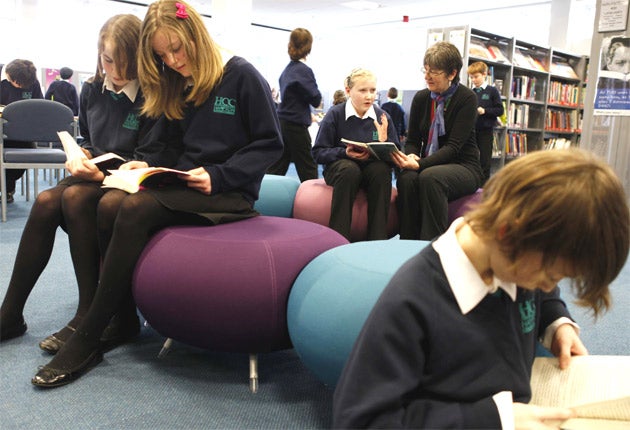School applications: 'You've either got to lower your standards or move house'
Richard Garner meets the parents who have decided to set up their own schools

Your support helps us to tell the story
From reproductive rights to climate change to Big Tech, The Independent is on the ground when the story is developing. Whether it's investigating the financials of Elon Musk's pro-Trump PAC or producing our latest documentary, 'The A Word', which shines a light on the American women fighting for reproductive rights, we know how important it is to parse out the facts from the messaging.
At such a critical moment in US history, we need reporters on the ground. Your donation allows us to keep sending journalists to speak to both sides of the story.
The Independent is trusted by Americans across the entire political spectrum. And unlike many other quality news outlets, we choose not to lock Americans out of our reporting and analysis with paywalls. We believe quality journalism should be available to everyone, paid for by those who can afford it.
Your support makes all the difference.The choice is stark, according to Simon Fitzpatrick, who has two young children at primary school. "You've either got to lower your sights and standards, cancel all your holidays and go independent, or move house," he says.
Mr Fitzpatrick, whose two children, Edward and Emma, are aged five and seven, lives in Wandsworth in south London. It is the borough where the largest percentage of children fail to gain access to their first-choice school.
Figures released on Monday showed only 48 per cent of applications in the borough resulted in children being accepted by their preferred school, compared with a national rate of over 80 per cent.
This is one of the reasons why Mr Fitzpatrick and many other parents from Wandsworth were huddled together at a conference in London yesterday, listening to the Conservatives' plans to enable parents to set up their own schools – the "Swedish solution", as it has been dubbed.
So far, 1,200 parents have lent their support to the campaign in protest at the lack of choice available at secondary school level. They have already identified a 100-year-old hospital building, which has lain empty for more than a year, that could be converted into a 900-pupil school by September 2013 – when Mr Fitzpatrick's first child is due to start secondary school. The parents have also talked to three education providers who might like to run the school. All the project needs now is government backing.
Such a project would be a prime contender for funding under the Conservatives' proposals to set up a network of independent "free" schools run by a range of organisations to provide more choice for parents – a model pioneered in Sweden.
Also at the conference were David Adams and Gary Murrell. Their school, Priors Marston in Warwickshire, was closed by the local county council more than a decade ago, but the village was anxious it should stay open and it is now funded by donations from the community.
Mr Adams, an accountant and chairman of the trustees of the school, said: "We were forbidden from charging fees because of a trust deed signed by Earl Spencer donating the land for a school for the poor and working-class children of the village, so we rely on voluntary contributions. We had already lost one pub in the village and nearly lost the post office, so we didn't want to lose the school."
As a state primary school it had about 45 pupils. Since going private, it has added a nursery and now provides for more than 60 children.
"We pride ourselves on small class sizes – no class is more than 20 – and people come from miles around," said Mr Adams. "The nearest state primary school is miles away, and who wants to put their child on a bus in the dark on a cold February morning?"
Under the Conservatives' proposals, there would be a network of similar schools around the country for parents dissatisfied with the state sector. Baroness Morgan, a former aide to Tony Blair, said at the conference that Labour also supported parents who set up their own school.
She cited a new academy in Lambeth, south London, established by parents who faced a similar problem to parents in Wandsworth. She told the conference that it was unclear how the Conservatives planned to fund their proposals. "Evidence from Sweden shows there has been no improvement in standards and there is a tendency for segregation [of race and income groups]," she said.
David Laws, the Liberal Democrats' education spokesman, said that even in Sweden between 85 and 90 per cent of the schools were municipally funded state schools. "It will be unpopular to take away capital from existing schools in order to create surplus capacity of school places," he said.
But Michael Gove, the Conservatives' schools spokesman, said the evidence from the "free" schools in Sweden showed they had made strides in improving standards. "There is also no segregation of parents or racial or income lines as a result of school choice," he said. "Let's get real. The people who gain now out of the limited areas of choice that are available are the well-connected and the wealthy. The people who get locked out are the poorer families.
"Nobody can tell me working-class mums and dads don't want this. They're in schools led by heads and run by local authorities who don't give them what they need."
Join our commenting forum
Join thought-provoking conversations, follow other Independent readers and see their replies
Comments